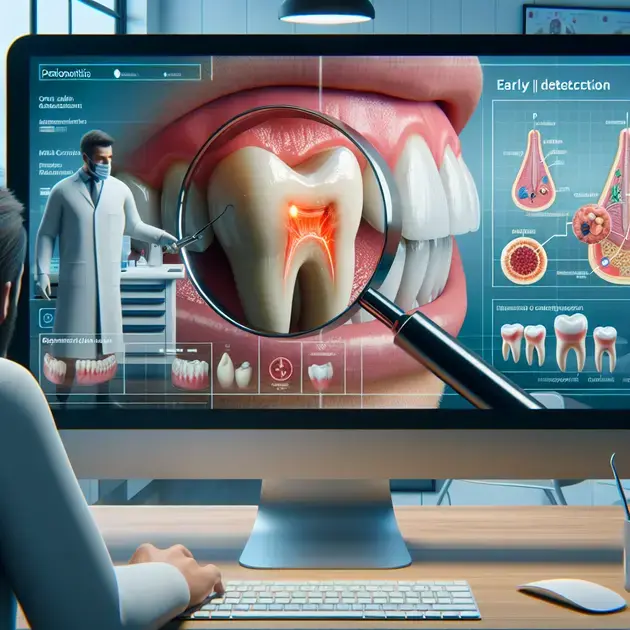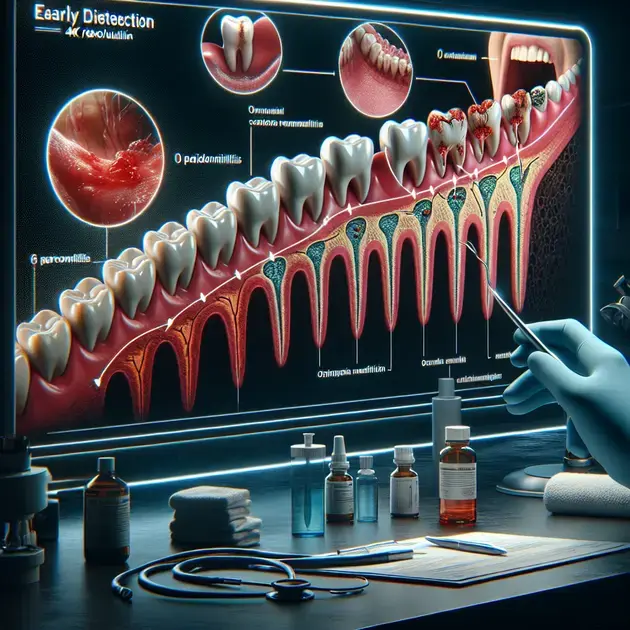Effective medication for periodontitis is crucial for managing this chronic inflammatory condition that affects the gums and bone supporting the teeth. With advancements in dental research and technology, there are now comprehensive guides available to help individuals navigate the various treatment options.
From antibiotics to surgical interventions, this guide will explore the most up-to-date methods of treating periodontitis effectively. Understanding the importance of early detection and personalized treatment plans is essential in combating this prevalent dental issue.

Understanding Periodontitis Treatment Options
When it comes to understanding periodontitis treatment options, it’s essential to consider the various approaches available to manage this condition effectively. One recommended step is to consult with a periodontist who specializes in treating gum diseases. Websites such as WebMD provide detailed information on periodontitis treatment options, outlining procedures such as scaling and root planing, dental surgery, and antibiotic therapy.
For individuals seeking non-invasive options, lifestyle changes play a crucial role in periodontitis management. Apps like MyFitnessPal can help track nutritional intake and promote a balanced diet rich in vitamins and minerals essential for gum health. Additionally, practicing good oral hygiene habits with the guidance of the Oral-B app can aid in preventing and controlling periodontitis.
Another aspect to consider in understanding periodontitis treatment options is the importance of regular dental check-ups. Using platforms like Zocdoc, patients can easily schedule appointments with periodontists for comprehensive evaluations and personalized treatment plans tailored to their specific needs. Early detection of periodontitis is key to successful management and preventing further complications.
By exploring the range of treatment options available and utilizing digital resources for guidance and support, individuals can take proactive steps towards improving their periodontal health and overall well-being.
Antibiotics and Their Role in Periodontitis Management
Antibiotics play a significant role in periodontitis management by targeting the bacteria responsible for gum infections and inflammation. Understanding how antibiotics work and their specific role in treating periodontitis is crucial for effective disease control. Websites like Mayo Clinic offer detailed insights into the use of antibiotics in periodontal treatment, highlighting their effectiveness in reducing infection and promoting gum healing.
When considering antibiotic therapy for periodontitis, it is essential to follow the guidance of a healthcare professional, such as a dentist or periodontist. Apps like HealthTap provide access to virtual consultations with dental experts who can prescribe antibiotics when necessary and monitor their effectiveness. It is important to adhere to the prescribed dosage and duration to maximize the benefits of antibiotics in combating periodontal infections.
In addition to antibiotic therapy, maintaining good oral hygiene practices is key to supporting the effectiveness of treatment. Utilizing toothbrushing apps like Philips Sonicare can help optimize plaque removal and reduce bacterial growth in the gums. By combining antibiotics with proper oral care techniques, individuals can enhance the outcomes of periodontitis management and promote long-term gum health.
Overall, antibiotics play a vital role in controlling periodontitis when used appropriately in conjunction with other treatment modalities and oral healthcare measures.
The Significance of Early Detection in Periodontitis Treatment
Early detection of periodontitis is paramount in ensuring timely intervention and preventing the progression of gum disease. Recognizing the signs and symptoms of periodontitis can aid in prompt diagnosis and treatment initiation. Websites like Colgate provide information on the early warning signs of periodontitis, such as swollen gums, persistent bad breath, and gum recession.
Empowering individuals with knowledge about the importance of early detection can be facilitated through educational apps like ADA’s MouthHealthy, which offer interactive tools and resources for learning about oral health conditions. Regular use of these apps can help individuals monitor their gum health and seek professional evaluation if any concerning symptoms arise.
Booking regular dental screenings through platforms like Dentistry.com enables individuals to stay proactive in their oral health maintenance and detect periodontitis in its early stages. Early intervention through professional treatments like deep cleanings and gum therapies can effectively manage periodontitis and prevent advanced complications, such as tooth loss.
By emphasizing the significance of early detection and leveraging digital tools for awareness and monitoring, individuals can take control of their periodontal health and address issues proactively for better treatment outcomes.

Key Medication for Effective Periodontitis Treatment
Periodontitis is a serious gum infection that damages the soft tissue and destroys the bone that supports your teeth. It is essential to use the right medication to effectively treat this condition. One key medication for periodontitis treatment is antibiotics. These medications help to kill the bacteria causing the infection and reduce inflammation in the gums. Common antibiotics prescribed for periodontitis include doxycycline, minocycline, and metronidazole.
Another important medication for periodontitis treatment is antimicrobial mouth rinses. These rinses contain specific ingredients that help to reduce the number of bacteria in your mouth, promoting healing and preventing further infection. Chlorhexidine and essential oils are common ingredients found in these mouth rinses.
In some cases, your dentist may also recommend using an antiseptic chip or gel. These products are placed directly into the pockets of your gums where bacteria thrive. They slowly release medication to target the infection and promote healing.
It is crucial to follow your dentist’s recommendations and complete the full course of medication to ensure effective treatment of periodontitis. Additionally, maintaining good oral hygiene practices, such as regular brushing and flossing, is essential to prevent the recurrence of the infection.
By incorporating the right medications into your periodontitis treatment plan, you can effectively manage the condition and prevent further damage to your oral health.
The Importance of Medication in Periodontitis Management
Medication plays a crucial role in the management of periodontitis, a condition that can lead to serious complications if left untreated. One of the primary reasons for the importance of medication in periodontitis management is its ability to target the bacteria responsible for the infection. Antibiotics and antimicrobial mouth rinses can help to kill these bacteria and reduce inflammation in the gums.
Additionally, medication can aid in controlling the progression of periodontitis and preventing further damage to the gums and supporting structures of the teeth. By using the right medications as prescribed by your dentist, you can help to slow down the advancement of the infection and promote healing.
Furthermore, medication can also alleviate the symptoms associated with periodontitis, such as gum inflammation, bleeding, and pain. By addressing these symptoms with the appropriate medication, you can improve your comfort and quality of life while undergoing treatment for periodontitis.
It is essential to work closely with your dentist to determine the most effective medication for your specific case of periodontitis. By following your dentist’s recommendations and adhering to the prescribed treatment plan, you can effectively manage the condition and improve your oral health in the long term.
Remember, medication is a valuable tool in the management of periodontitis and should be used in conjunction with professional dental care and good oral hygiene practices to achieve optimal outcomes.
Early Detection’s Vital Role in Periodontitis Medication
Early detection plays a vital role in the successful medication of periodontitis. Detecting the signs of periodontitis in its early stages allows for prompt intervention and treatment, preventing further damage to the gums and supporting bone. Regular dental check-ups and screenings are crucial for identifying periodontitis early on.
When periodontitis is detected early, dentists can prescribe the appropriate medication to target the infection and prevent its progression. Antibiotics, antimicrobial mouth rinses, and other medications can be initiated promptly to address the bacterial activity in the gums and promote healing.
Moreover, early detection of periodontitis can lead to better treatment outcomes and reduced risk of complications. By seeking timely dental care and receiving early intervention, patients can effectively manage the condition and preserve their oral health.
It is important for individuals to be aware of the common signs of periodontitis, such as persistent bad breath, red or swollen gums, and gums that bleed easily. By recognizing these symptoms and seeking professional dental care, early detection can be achieved, allowing for timely medication and treatment.
Overall, early detection is key to successful medication in periodontitis management. By staying vigilant about your oral health and attending regular dental visits, you can catch periodontitis early and take the necessary steps to address the condition before it progresses.
Conclusion
Effective management of periodontitis relies heavily on the use of appropriate medication. Antibiotics, such as doxycycline, minocycline, and metronidazole, play a crucial role in treating the infection and reducing gum inflammation. Antimicrobial mouth rinses containing ingredients like chlorhexidine and essential oils help in eradicating bacteria and promoting oral healing.
Medication also contributes to controlling the progression of periodontitis, preventing further damage to the gums and teeth. By following your dentist’s recommendations and completing the prescribed course of medication, you can slow down the infection’s advancement and support the healing process. Additionally, these medications alleviate symptoms like gum inflammation, bleeding, and pain, enhancing your comfort and quality of life during treatment.
Early detection is paramount in successfully medicating periodontitis. Identifying signs early allows for immediate intervention, preventing extensive damage. Timely prescription of antibiotics, mouth rinses, or other medications can address bacterial activity, promoting healing. By staying vigilant about oral health, attending regular dental check-ups, and recognizing common symptoms like bad breath and swollen gums, individuals can achieve early detection, ensuring timely medication and treatment before the condition escalates.



